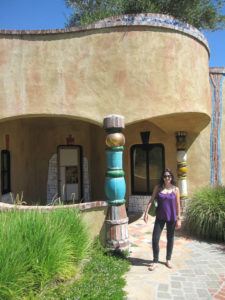
We’re driving on the Golden Gate. It’s cloudy with light traffic. We’re spending three days in Napa and Sonoma, and I cannot wait.
It was August 2010, and my then boyfriend and now husband, Evan and I were doing a driving tour of California. I knew before we’d even arrived that I was going to love wine country. I felt excited, impatient, and also emotional.
Weird! Why was I soo excited?
When I explain my excitement on that trip, someone who doesn’t know me very well may think I just love getting my buzz on.
(Not completely false.)
But looking back several years later with a lot more self awareness and understanding of my why, and what’s driving me, I now understand on a much deeper level why I respond emotionally to an event…ANY event.
Memorable and/or key experiences can help us identify what matters most to us. We can use these seemingly one-off events and discoveries to guide the direction we take with our lives (and of course work).
Here’s how to decode a memorable experience so the benefits of that experience can pervade your daily life to help you understanding your values.
What are Your Personal Values? How to Uncover them for Life and Work
What’s Your Favorite Part?
When we arrived at Napa Valley, we drove straight to Quixote Winery.
The ceramic tiling, gold leaf dome, bright colors, and architecture of the building caught my eye immediately. If you’ve been to Barcelona, you’d notice a resemblance between Quixote’s architecture and Gaudi’s work.

It was beautiful. This wasn’t just a wine tasting, it was a bigger experience.
Quixote’s website highlights “Hundertwasser’s architectural philosophy was devoted to elevating man’s sense of himself.”
That’s exactly it. Hundertwasser did elevate my sense of self. I felt more creative because the place around me was full of inspiration, open space and creativity.
My favorite aspect of the vineyard was the combination of two different elements, art and wine, to create one wholly, very immersive, educational, and fun day for visitors. This is one way to differentiate in an extremely competitive place.
As we went through the tour, Evan and I learned about the wine-making process and what it takes to make a good wine.
There’s so much the winemaker can’t control, which is stressful to say the least.
Wine growers are dependent on sunlight, temperature and water. They need to carefully select the land and make sure the slopes face a certain way so the fruit is exposed to the sun. They can plan and prepare, but there are a lot of unknowns.
What if there’s a heat wave? The grapes may overcook.
What if it’s too cold? The grapes don’t mature properly.
What about storing the wine? There are several options.
Despite these challenges, Quixote and other wineries work hard to make the best wine they can make. Through collaboration, science, art, problem solving, they get it done.
After the tour, we sat outside for the wine tasting. It was breezy, sunny, and the wine was flowing.
Although this memory stuck with me, at the time, I didn’t dig deeper. I thought I simply loved wine so I bought a book called the “Wine Bible” (yup, it exists! And yes I thought that was the answer to my problems) to learn all-things wine, and read up on how to transition from my media career to a career in the wine world.
Although I learned some new things, I was asking the wrong question, which was “How can I immerse myself in the wine world so that I could experience the things I experienced that day?
Let’s re frame. How about selecting the best parts of an experience, then asking why:
“Why was I so attracted to the combination of wine and art?”
“Why do I have an appreciation for the wine-making process? What does it represent for me?”
“Why does it feel so good to reward myself with that one glass? What am I looking for?”
What Does It Mean?
Visiting Quixote allowed me to tap into my appreciation for creativity, for working bigger. Appreciating the wine and art combination is the same reason I was drawn to Steve Jobs’ approach to combining technology with art. These are two very different examples with a common thread.
They connected me to a core value: creativity.
I don’t need to be a winemaker or an artist, I just need to incorporate more creativity into my work.
When thinking about the process of wine, and why that appealed to me, I realized that a good wine is a product of a community, a team, people working together to solve the challenges that come with the process.
If it’s too sunny, what can we do to mitigate the impact on the grapes? How can we overcome these issues to produce the best product we can produce?
I love a challenge. I love solving problems.
I didn’t pursue a career in wine, and I have no regrets there. Instead, I’m building a business based on solving problems for people by redefining work.
Finally, I value fun, adventure and reward which is why I relished that hour outside at Quixote or look forward to sitting in my living room sipping Zinfandel after a long day. This may seem obvious, and we all likely need more fun and reward in our lives.
Now Let’s Connect the Dots.
I often hear, “It’s so hard to find my why,” and “I have so many interests, I have no idea how to pick one.”
It’s extremely hard to decode what drives you and who you are at your core. But maybe it’s hard because we’re not looking at the bigger picture in assessing our personal values when we have these big, memorable and seemingly one-off experiences.
Make a list of memorable experiences. Next to each experience, list why that experience was unforgettable.
What did you feel?
Who were you with?
What was important about it?
Review closely. What’s the common thread in your list? What values show up?
Allow this discovery, these values to guide all aspects of your life, especially your work, how you work, where you work, and who you surround yourself with.
We don’t necessarily need a glass of wine to be happy, but we do need the fun, the adventure, the reward.



Thanks for your comment Leah!